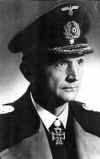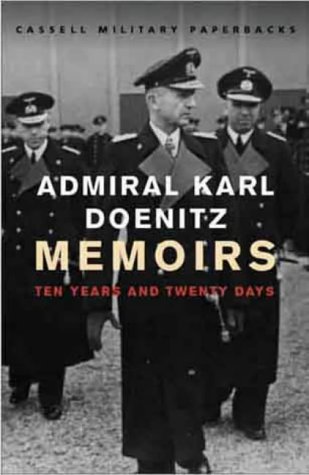
Note: One week
before the end of World War II Hitler
appointed DØnitz to succeed him as President of the Reich.
Based in the unoccupied northern city of Flensburg near the Danish border, DØnitz
functioned as German Head of State until 23 May 1945, fifteen days after the
unconditional surrender, when the allies declared his government handlungsunfähig
or incapable of acting, and ceased to recognise it.
GERMAN MEN AND WOMEN:
When I addressed the German
nation on May 1 telling it that the Fuehrer
had appointed me his successor, I said that my foremost task was to save the
lives of the German people. In order to achieve this goal, I ordered the German
High Command during the night of May 6-7 to sign the unconditional surrender for
all fronts.
On May 8 at 23 hours (11 P.M.) the arms will be silent.
German soldiers, veterans of countless battles, are now treading the bitter path
of captivity, and thereby making the last sacrifice for the life of our women
and children, and for the future of our nation.
We bow to all who have fallen. I have pledged myself to the
German people that in the coming times of want I will help courageous women and
children, as far as I humanly can, to alleviate their conditions. Whether this
will be possible I do not know.
We must face facts squarely. The unity of state and party
does not exist any more. The party has left the scene of its activities.
With the occupation of Germany, the power has been
transferred to the occupying authorities. It is up to them to confirm me in my
function and the Government I have appointed or decide whether to appoint a
different one. Should I be required
to help our Fatherland, I will remain at my post. Should the will of the German
people express itself in the appointment of a head of state, or should the
powers of occupation make it impossible for me to continue in my office remains
to be seen.
Duty keeps me in my difficult post for the sake of Germany. I will not remain one hour more than can be reconciled with the dignity of the Reich. I will disregard my person in this matter.
All of us have to face a difficult path. We have to walk it
with dignity, courage and discipline which those demand of us who sacrificed
their all for us. We must walk it by making the greatest efforts to create a
firm basis for our future lives.
We will walk it unitedly. Without this unity we shall not be able to overcome the misery of the times to come. We will walk it in the hope that one day our children may lead a free and secure existence in a peaceful Europe. On this thorny path, which we all will have to tread, I will try to help you as much as is possible, should I remain at my post. Should we succeed in going this way together, this step will be a service to the nation and to the Reich.
Sources: New York Times. Words of Peace-Words of War

Memoirs: Ten Years and Twenty Days
The way the U-boat campaign was waged, as told by the man who invented U-boat tactics - Grand Admiral Karl Dönitz. The book covers Dönitz's early career with submarines in WWI and follows both his, and the U-Boat arm's, successes and failures through WW2. Full details of the U-Boat campaigns during WW2 are included as well as opinions, ideas and commentary on the period by Dönitz. Of particular interest are the comments regarding British and American conduct during the War.